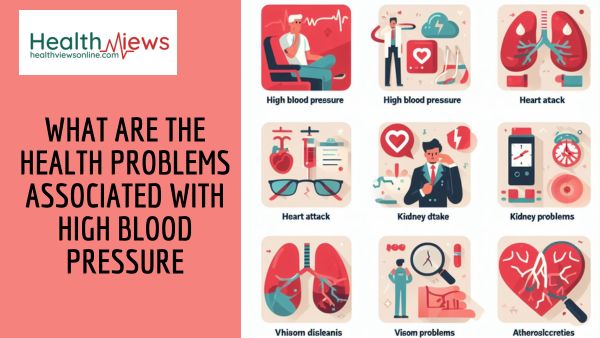High blood pressure is a common disorder affecting the arteries of the body. It is also known as hypertension. The constant pressure of the blood against the artery walls is too much if you have high blood pressure. To pump blood, the heart has to work harder. If uncontrolled, this can lead to various health problems associated with high blood pressure.
Healthy lifestyle choices such as quitting smoking, exercising, and eating well may help in the prevention and treatment of high blood pressure. High blood pressure medication is required for some people. In most cases, the actual reason for high blood pressure is unknown.
Also, Read Insomnia: Symptoms, Causes, Prevention, and Treatment
Top 10 Health Problems associated with High Blood pressure with Symptoms, Prevention, and Care Tips
1. Heart Disease
Symptoms – Chest discomfort, shortness of breath, and erratic heartbeat.
Prevention – Maintain a healthy diet, exercise regularly, stop smoking, and limit alcohol consumption.
Care tips – Monitor your blood pressure, take recommended medications, and listen to your doctor’s instructions.
Also, watch health views web stories: 8 Best Home Remedies for Hemorrhoids
2. Stroke
Symptoms – Sudden numbness or weakness in the face, arm, or leg, confusion, difficulty speaking or understanding, and severe headache.
Prevention – Blood pressure can be controlled with medication and lifestyle adjustments such as a low-sodium diet and exercise.
Care tips – Maintain a secure environment, recognize the affected body region as still part of the stroke survivor, and seek immediate medical attention if stroke symptoms occur.
3. Kidney Damage
Symptoms – Swelling in the legs, ankles, feet, or face, exhaustion, difficulty sleeping, increased urination, and blood in the urine
Prevention – Control your blood pressure, restrict your salt intake, and remain hydrated.
Care tips – Regularly check kidney function using blood and urine testing.
4. Eye problems
Symptoms – Blurred vision, sudden vision loss, eye pain, seeing spots or floaters
Prevention – Controlling blood pressure, quitting smoking, and eating a nutritious diet.
Care tips – Regular eye exams are recommended to diagnose and control hypertension-related eye problems.
5. Aneurysms
Symptoms – Usually asymptomatic until rupture, resulting in severe pain, disorientation, or loss of consciousness.
Prevention – Control your blood pressure, avoid smoking, and control your stress.
Care tips – If signs of a ruptured aneurysm appear, seek emergency medical assistance.
Also Watch Visual Story: 10 Foods to Boost Haemoglobin
6. Peripheral Artery Disease (PAD)
Symptoms – Symptoms include leg pain, cramping, numbness, coldness, and unhealed sores.
Prevention – Control your blood pressure, exercise regularly, and quit smoking.
Care tips – For diagnosis and treatment, seek the advice of a healthcare professional and maintain a nutritious diet. A low-saturated-fat diet helps regulate blood pressure and cholesterol levels.
7. Sexual Dysfunction
Symptoms – Erectile dysfunction in men, decreased sexual desire and satisfaction in both men and women
Prevention – Maintain a healthy lifestyle, reduce stress, and seek medical attention if necessary.
Care tips – Exercise, eating healthily, including a diet high in fruits and vegetables, having a reduced waistline, sleeping well, and quitting smoking are all things you can do to help with erections.
8. Cognitive Decline
Symptoms – Memory loss, confusion, and difficulty thinking or problem-solving are some symptoms.
Prevention – Control your blood pressure, participate in mental and physical activity, and eat a heart-healthy diet.
Care tips – Regular physical activity, a low-fat, high-fruit and vegetable diet, Omega-3 fatty acids, and keeping your mind engaged may help you avoid cognitive decline.
Also, watch health views web stories: Now Know 10 Best Nutrition Tips for Improving Your Health
9. Metabolic Syndrome
Symptoms – Obesity, high cholesterol, insulin resistance, and high blood pressure are all symptoms.
Prevention – Eat a well-balanced diet, exercise regularly, and keep a healthy weight.
Care tips – Choose foods that are good for your heart, engage in frequent physical activity, control your tension, and get adequate restful sleep.
10. Pregnancy Complications
Symptoms – Pregnancy-related high blood pressure (gestational hypertension) can cause edema, headaches, visual problems, and protein in the urine.
Prevention – Attend prenatal care appointments, reduce stress, and follow your healthcare provider’s advice.
Care tips – If hypertension develops during pregnancy, seek urgent medical attention and monitoring.
Consult your healthcare practitioner immediately if you believe you have high blood pressure or have been diagnosed with it but it is not under control. Taking certain precautions can help protect yourself from health problems associated with High Blood Pressure.
Routine health checks and monitoring of blood pressure are crucial for the early identification and treatment of these related health problems with High blood pressure.
Also, Read Complete Guide About:12 Common Digestive Disorders (Part1)
Source 2





